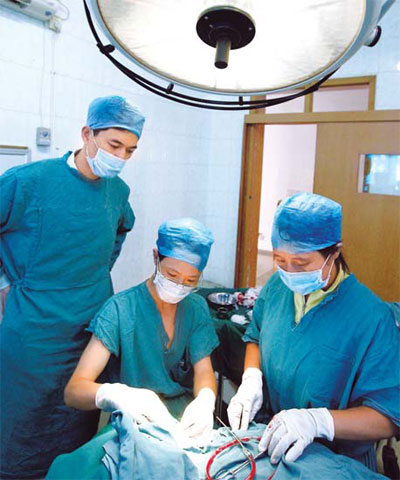Society
Doctors at receiving end in medical reform
By Wang Shanshan in Beijing (China Daily)
Updated: 2010-03-25 06:44
 |
Large Medium Small |
Doctors tied down
 |
|
Surgeons operate at a hospital in Huaibei, Anhui province. [WU HE/CHINA DAILY] |
Doctors at public hospitals even find it difficult to move within the public sector, let alone take jobs at private clinics, due to "handcuff" contracts, say analysts.
"For many doctors, if you work at a hospital you are there for life," said Chen at the China-Japan Friendship Hospital, a public facility. "Almost all the doctors I know who changed jobs either went abroad or left the profession altogether."
Zheng at the public China Meitan General Hospital agreed and explained: "Doctors are bound by hospitals. We have certificates for practicing medicine, but the certificates have to be registered at a certain hospital. The registration procedures are complicated and it can be very troublesome if we want to change jobs."
The Law on Medical Practitioners introduced in 1998 stipulates that certified doctors can only practice medicine at the hospital where they are registered. However, the Temporary Regulation on the Registration of Medical Practitioners, which came into force just 12 months later, bars physicians from being registered at more than one hospital.
The procedures to register are so complicated that many medics are actually forced to practice "illegally" for up to five years, said Ding Jiaming, a Chinese doctor who works in France. Ding practiced medicine in Beijing for more than 20 years before moving abroad.
As China does not have a medical "talent market", doctors are often neither valued nor treated as professionals by their hospital bosses, said economist Hu. "Public hospitals have lots of administrators, so many that they usually account for more than one-third of a hospital's staff. These administrators have far more access to resources than doctors and, because they are often unfairly distributed, this has led to most doctors developing a passive mood," he said.
Many doctors are poorly paid. Qu Ruimin, a doctor for 17 years at the popular, 100-year-old Beijing Xuanwu Traditional Chinese Medicine Hospital, said she is paid less than 3,000 yuan a month.
A doctor's workload is also extremely heavy. Dr Chen said he receives more than 100 patients every day.
However, rather than giving doctors incentives to perform and improve their skills, healthcare administrators focus on regulating their behavior. There are almost 150 rules and laws that govern the doctor-patient relationship, said Qiu at Peking University.
One regulation in particular, called Some Provisions of the Supreme People's Court on Evidence in Civil Procedures, is seen as the Sword of Damocles hanging over doctors' heads. It stipulates that medics must prove their innocence in court cases relating to medical disputes.
Many experts argue, however, that the rule directly conflicts with the Provisions on Medical Accidents, which was introduced in 2002 and makes local medical associations responsible for deciding if a doctor is at fault in the event of an accident. Effectively this means a defendant is judged by his or her peers, and analysts fear those doctors with guanxi - influential connections - are more likely to escape punishment for malpractice.
"There is a conflict," said Wu Dong, an attorney with the Shanghai M&A Law Firm who specializes in cases of medical disputes. "There is often no justice when medical associations make their decisions. Members of medical associations are all professionals and they all cover up mistakes."
Zheng explained doctors protect each other because they are afraid that one day, they might be on the stand themselves.
"Doctors would be more prepared to stand up and speak out in the interest of patients if the majority didn't feel besieged, like they do now," he said.







